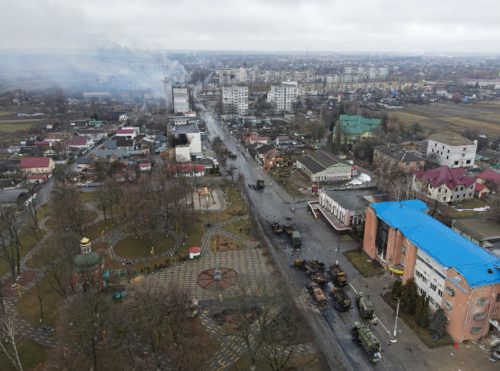I’ve mentioned before that Russian leadership operates by removing people of any competence, favoring instead those who fight dirty yet pose no challenge. That’s a simplification of dictatorships, but it helps highlight an essential element to faulty power projection.
Ukraine has been demonstrating the problem. Because Russia has been selecting people who are unable to pose a challenge to Russia… it seems they are having a high rate of failure when actually challenged to fight in the Ukraine, especially given they claim it is Russian.
Reuters has the following buried lede within a detailed look at the weapons being used.
…Russia so far has little to show for its advance… Russian forces are becoming increasingly frustrated… Photos from Ukraine have shown abandoned Russian vehicles, including tanks, raising questions about logistical failures alongside Ukranian attacks. “They simply don’t have a lot of experience moving on another nation state at this level of complexity and size,” a senior U.S. defence official said of the Russian army. The official said it was unclear whether it was a failure in planning or execution, but added that Russian forces were likely to adapt and change the way they operate.

It’s the last part again that I find puzzling. Adapt and change? The U.S. official is likely projecting, expecting logic to be a viable trait in dictatorships (it’s not).
…every day it goes on there’s a cost and the risk goes up. And they’re not doing [maximum use of force] and it just is really hard to explain for any realistic reason.”
At some point people looking in from the outside might stop trying to make sense of Russian incompetence and just call it what it is.
Russia has been showing a failure to adapt and change; revealing an inability to become more proficient to overcome challenges. A belief in easy wins through terror tactics and dirty tricks isn’t doing them any favors against a viable opponent.
Also relevant is the simple fact that Russia didn’t train on urban warfare before embarking on an invasion that hinges on urban warfare.
Russian combined-arms doctrine has generally advised against making cities primary objectives. The belief has been that if the enemy’s main force in the field is destroyed, then his cities will surrender.
What evidence do we have that Russia is likely to improve or change doctrine easily? Who would they copy or steal from to get a new idea? They are following a recipe for disaster.
“These cities are going to get overrun, and it’s going to be a long, long haul for the Russians,” Mann continued. “If they think because they occupy these cities, that they’re done – if you look at the fighting spirit of the Ukrainian people – they are in for a nasty guerrilla warfare campaign that is going to bleed them dry.”
Instead I think the major risk is the opposite of improvement, which is to say Russian leaders will devolve and become worse through seeking easier targets, even straw-men and ghosts, who resist them less.
Tetyana Vlasenko was bleeding from 12 bullet wounds to her legs when she begged a Russian military officer nearby for help. His soldiers had opened fire on her family’s car, yet the officer was apologetic as the soldiers gave them first aid.
While she lay there seriously hurt, she recalls him saying, “I’m sorry for doing this but we have an order to shoot everything that is moving, and you cannot imagine how many cars like this we have full of Nazis who are trying to bomb us,” Tetyana, 42, told NBC News on Wednesday from her bed in Kyiv City Hospital 17.